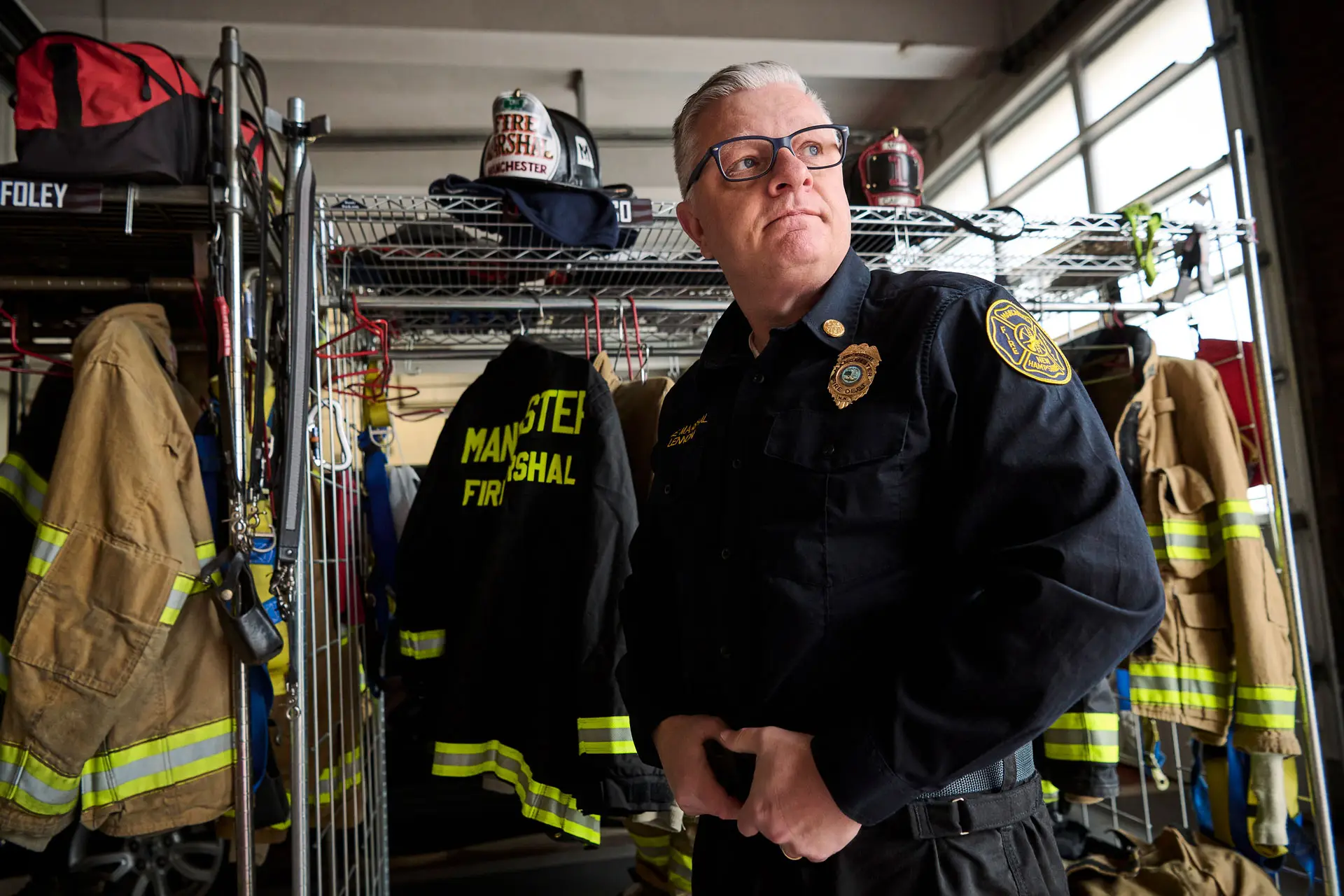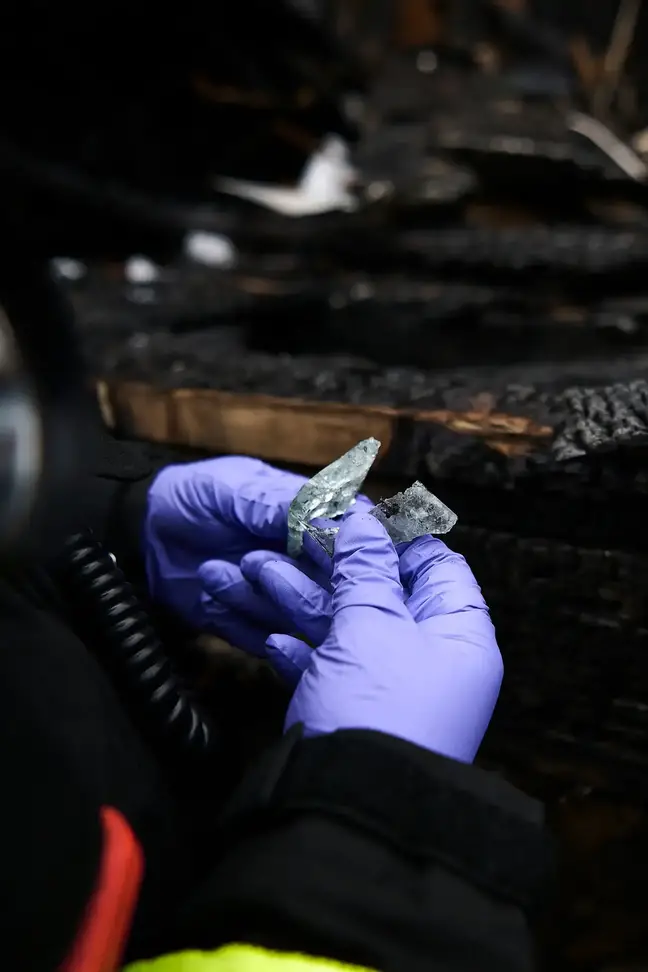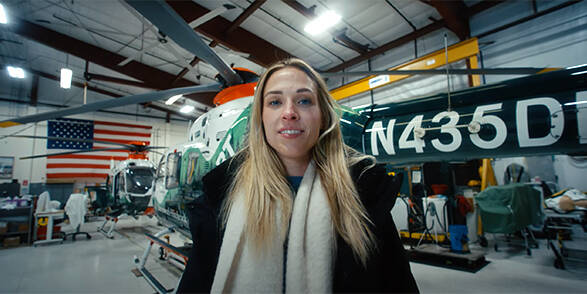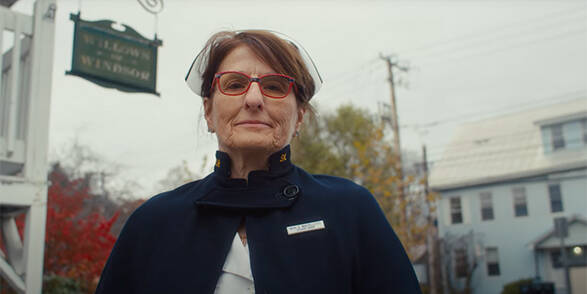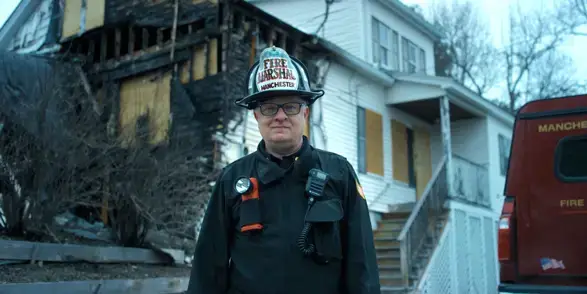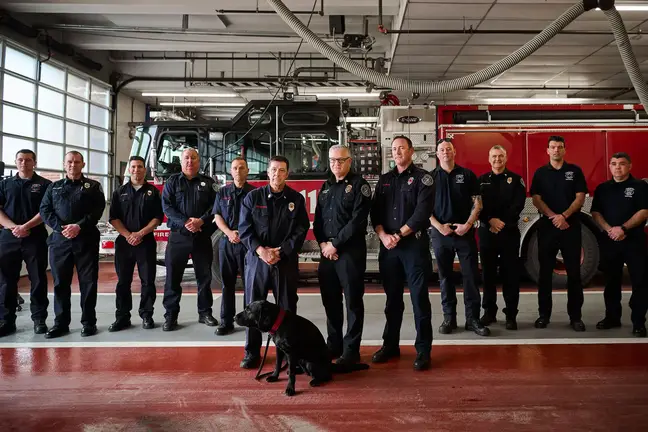
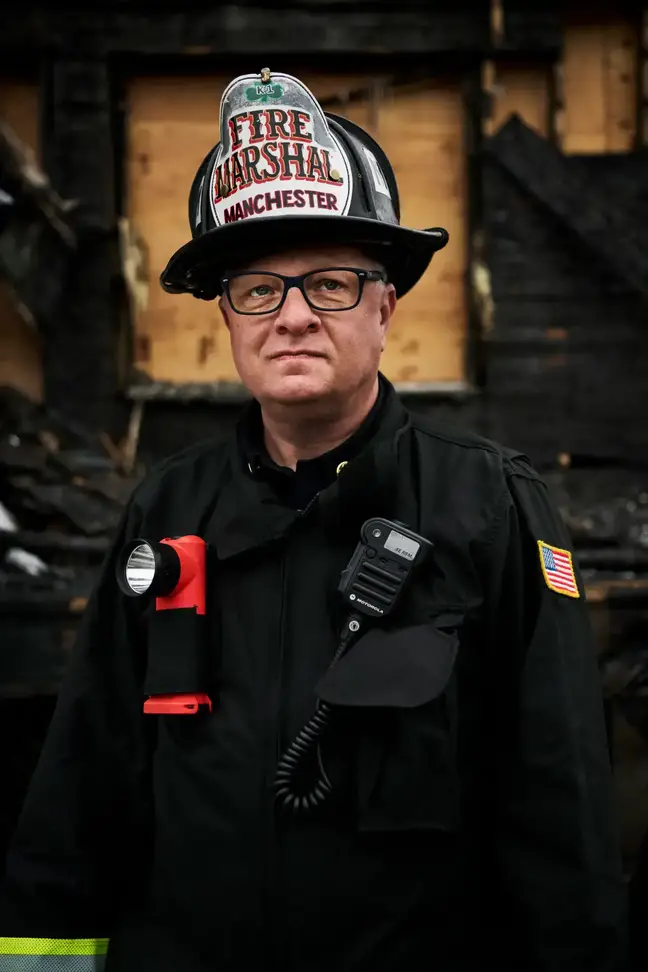
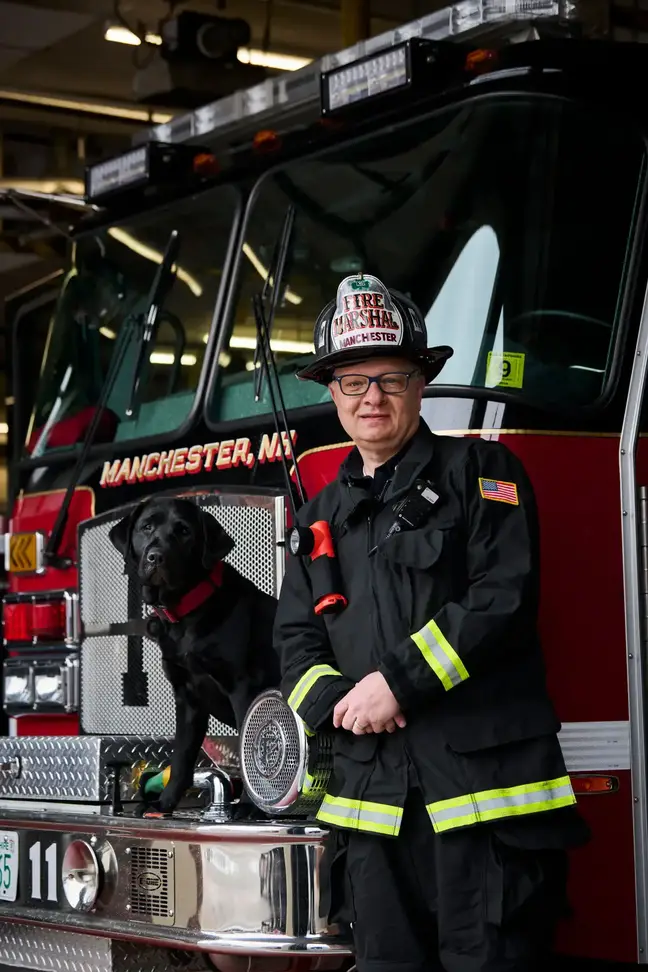


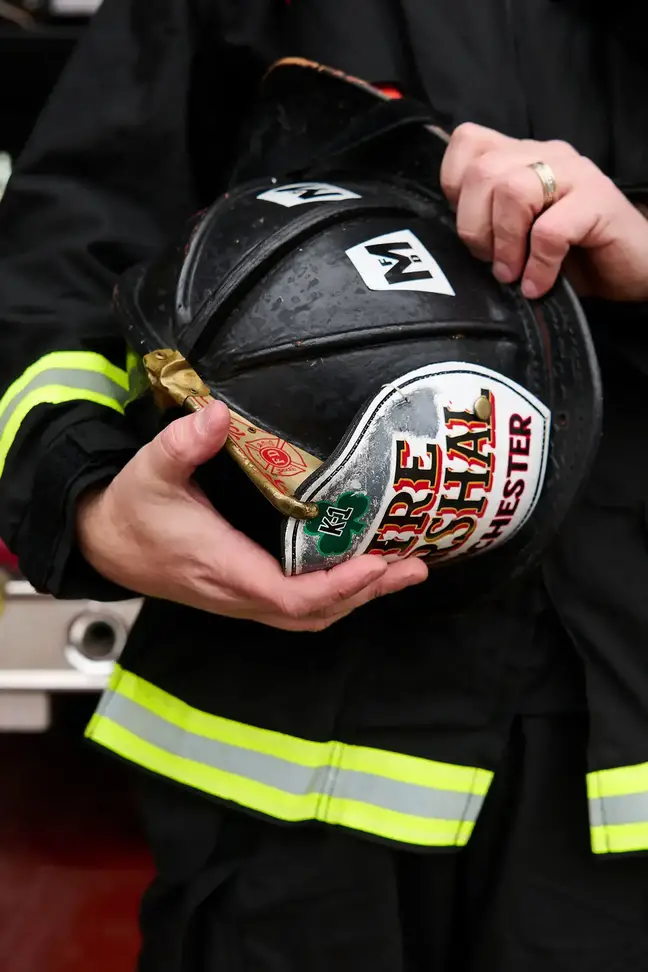
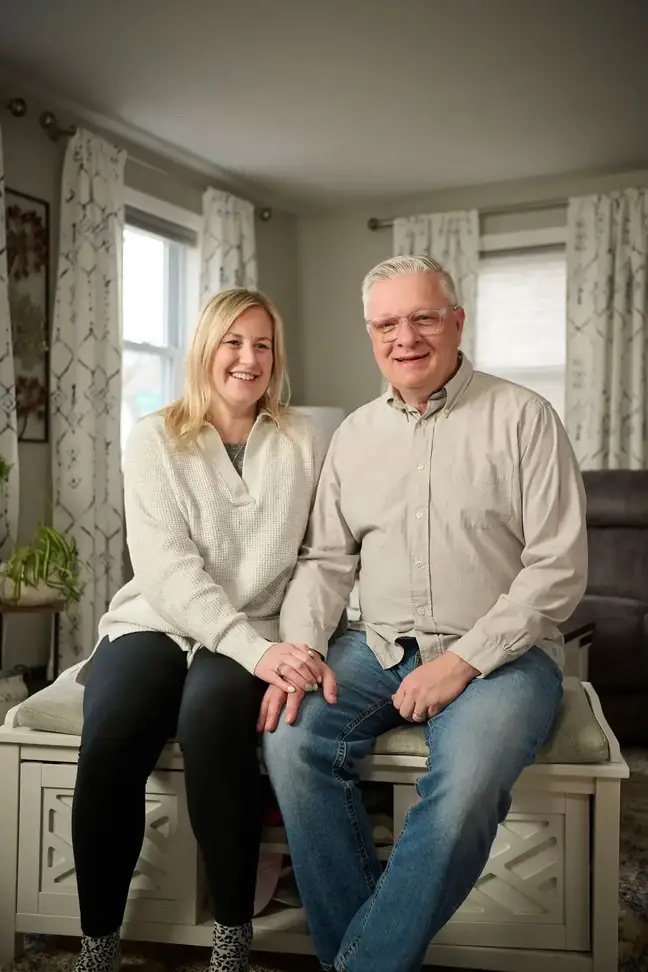
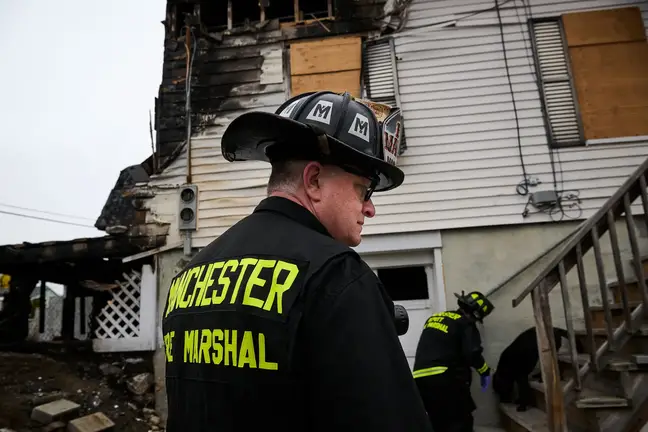
“This program is so important to the fire service. People are going to be given another chance.”
— Peter Lennon
Screening, Surgery, Recovery
Peter Lennon, 45, was climbing castles in Scotland with his family and found himself lagging behind. It was odd. Walking around and being on his feet all day shouldn’t have been a problem.
As the Fire Marshal for the city of Manchester, New Hampshire, work keeps Lennon active with code enforcement, reviewing plans, public education, and fire investigations for every incident in the city. He’s held the position for 18 years, and also serves as a police officer in the neighboring town of Auburn.
For over a year, Lennon was experiencing fatigue and other symptoms, including restless legs that would keep him up at night. “I just thought it was my age, life over 40,” he said. He tried more exercise, cutting out alcohol, and taking vitamins, but he still wasn’t feeling like himself.
In May 2023, the Local 856 firefighter’s union and the City of Manchester launched the city’s first free cancer screening program for the fire department. Organized by Dartmouth Health and Anthem Blue Cross Blue Shield, this screening—along with a tumor removal surgery performed by Dartmouth Hitchcock Clinic Manchester's Jeffrey R. Harnsberger, MD—saved Lennon's life.
Risk and reward
Growing up, Lennon’s family was involved with the community, and thanks to a stepbrother who was a fire chief, he spent a lot of time at the local fire station. From firefighter, to fire inspector, and now Fire Marshal, Lennon has dedicated his life to keeping people safe.
“Like anything in emergency services, we're reactive to what's going on that day,” he said. A good day is quiet. But those are rare. The adrenaline rush of calls, and the camaraderie among his colleagues is deeply rewarding, despite the risks that come with the job.
According to the International Association of Fire Fighters (IAFF), firefighters are at a higher risk for cancer than the general population. Exposure to chemicals, toxins, and other carcinogens from clothing, furniture, and flooring puts them at risk, causing 65 percent of line-of-duty deaths each year—highlighting the need for PPE, personal protective equipment, and thorough decontamination after every fire.
On the first day of the new screening program, almost 200 firefighters and fire officials were shepherded through a low-dose CT lung scan and dermatology screening at Dartmouth Hitchcock Clinics Manchester. “We figured that somebody was gonna have a positive finding from this. I didn't think it was gonna be me,” Lennon said.
A grim diagnosis
After the screening, Lennon was sent for a follow-up appointment, which included blood tests and a colonoscopy. While two polyps were removed in-office, Lennon also had a tumor that would require surgery. He was quickly referred to Harnsberger, Colon and Rectal Surgeon, at Dartmouth Hitchcock Clinics Manchester.
You can go and get another opinion, Lennon recalls Harnsberger saying, but my opinion is going to be to take out the tumor and make it better.
Lennon knew that time was of the essence: Harnsberger said that if this wasn’t taken care of immediately, the tumor could grow, and he’d only have three or four years to live. “I don't like to think about it,” said Colleen, Lennon’s wife. Together, they have an 11 and a 7-year-old daughter, as well as two older daughters from previous marriages.
Surgery was scheduled for October 20, and the time leading up to it was stressful. In addition to Colleen and his daughters, Lennon was also thinking about his father. “He’s a very important person in my life,” Lennon said. “It was very, very hard to tell him.”
A few years back, the family lost Lennon’s sister to the opioid crisis. “My father had to bury his daughter. I didn't want to have him bury his son too,” he said.
Finding a way forward
Lennon’s surgery took place on a Friday, and he was supposed to be in the hospital for a week. “The next morning I was eating breakfast,” he said. “I pushed myself probably a little bit more than I should have.”
In addition to the tumor, Harnsberger removed a foot of colon, around 25 lymph nodes, and Lennon’s appendix as an extra precaution. He also spent time on Lennon’s spleen. “The surgery was longer than usual, but more thorough. I do feel very confident that Dr. Harnsberger got everything,” Lennon said.
The nurses, including Jenna Noone, RN, BSN, were incredible, he said. He wanted the catheter out, he got the catheter out. He wanted to walk, and he walked; down the hospital hallway, determined to move forward.
“He was determined to just be home,” Colleen said, and she was focused on making it as comfortable as possible. Two days later on Sunday, he was home. “I just remember losing it when I walked in the house. I didn't think I was going to be home again,” Lennon said.
Six weeks later, Lennon had a second homecoming, when he decided to go back to work. His colleagues welcomed him and offered support: with check-ins, rides, and heparin shots necessary in post-op care. Lennon knew that he’d be back: he made it his mission. “I really wanted to retire when I was ready to retire. Not because of a sickness or injury,” he said.
Now, he sees it as his role to be an advocate for preventative care and screenings like this. “This program is so important to the fire service,” he said. “People are going to be given another chance.”
Another chance for family, life, work, and adventure—including an upcoming one across the pond. “We're gonna do round two in Scotland this year,” Lennon said. He might even climb a castle or two.
Screening and Prevention Programs
When cancers are found early, before they have spread to other parts of the body, they are often easier to treat and have better outcomes. Identifying cancer early can save lives. At Dartmouth Cancer Center, our healthcare professionals encourage regular cancer screening. We offer the following services as part of our screening and prevention programs:
Breast cancer: Our experts recommend regular screening mammograms starting at age 40.
Colorectal cancer: The American Cancer Society recommends to start screening from age 45–50.
Skin cancer: See your doctor to ask about moles or birthmarks that have changed in appearance, size or texture.
Lung cancer: Screenings should start between ages 50 and 80 and are based on smoking history; not all qualify.
Cervical cancer: Annual pelvic exams are recommended for women over the age of 21.
Prostate cancer: Men should speak with their doctor about being screened.
More patient stories from around Dartmouth Health
Thomas's Way Forward
Orthopaedic Patient
Treated by
Neal B. Goldenberg, MD, MA
Treated at
Cheshire Medical Center
Karen's Way Forward
Brain Tumor Patient
Treated by
Matthew R. Vernon, MD / Nathan E. Simmons, MD / Joseph Shin, MD / Krzysztof A. Bujarski, MD
Treated at
Southwestern Vermont Medical Center / Dartmouth Hitchcock Medical Center
Caroline's Way Forward
Hypothermia Patient
Treated by
Caleb A. Moffatt, RN, CCRN, CFRN, NREMT / Jeremy C. Patten, NRP, FP-C / Brian L. Jones, MD, PhD / Jay C. Buckey, Jr., MD / Pam Hannigan, RN
Treated at
Dartmouth Hitchcock Medical Center
Joseph's Way Forward
Cancer Patient
Treated by
Konstantin H. Dragnev, MD / Elliot D. Backer, MD
Treated at
Dartmouth Cancer Center at Dartmouth Hitchcock Medical Center
Jeff's Way Forward
Pancreatitis Patient
Treated by
Michelle Miller, RN, BSN, OCN / Jen Carlin, RN, BSN / Timothy B. Gardner, MD / Alena K. Shoemaker, MD
Treated at
New London Hospital / Dartmouth Hitchcock Medical Center
Susan's Way Forward
Cardiac Patient
Treated by
Jock N. McCullough, MD / Lisa M. Olmstead, RN / Debra Fitzpatrick, RNC, AANAC / Sydney Reigle, MS, ACSM-CEP, ACSM-EIM
Treated at
Dartmouth Hitchcock Medical Center / Valley Regional Hospital
Peter's Way Forward
Colorectal Cancer Survivor
Treated by
Jeffrey R. Harnsberger, MD / Jenna Noone, RN, BSN
Treated at
Dartmouth Cancer Center at Dartmouth Hitchcock Clinics Manchester
Chris's Way Forward
Stroke Rehabilitation Patient
Treated by
Belinda M. Needham-Shropshire, OT, MAPT, MBA / Cheryl Beaulieu, CCC-SLP
Treated at
Mt. Ascutney Hospital and Health Center
Connor's Way Forward
Pediatric Cancer Patient
Treated by
Angela M. Ricci, MD / Geraldine Rubin, MD / Filomena Kersey, RDN, LD
Treated at
Dartmouth Health Children’s at Cheshire Medical Center / Dartmouth Health Children’s at Dartmouth Hitchcock Medical Center
Kathy's Way Forward
Orthopaedic Surgery Patient
Treated by
Timothy J. Lin, MD, MS
Treated at
Alice Peck Day Memorial Hospital
Krystal's Way Forward
Bariatric Surgery Patient
Treated by
Sarah H. Finn, MD / David A. Gould, MD
Treated at
Dartmouth Hitchcock Clinics Bedford / Dartmouth Hitchcock Clinics Manchester
Clover's Way Forward
Gender Affirming Care Patient
Treated by
Cheryl A. Sturgis, MSPAS, PA-C
Treated at
Dartmouth Hitchcock Medical Center
